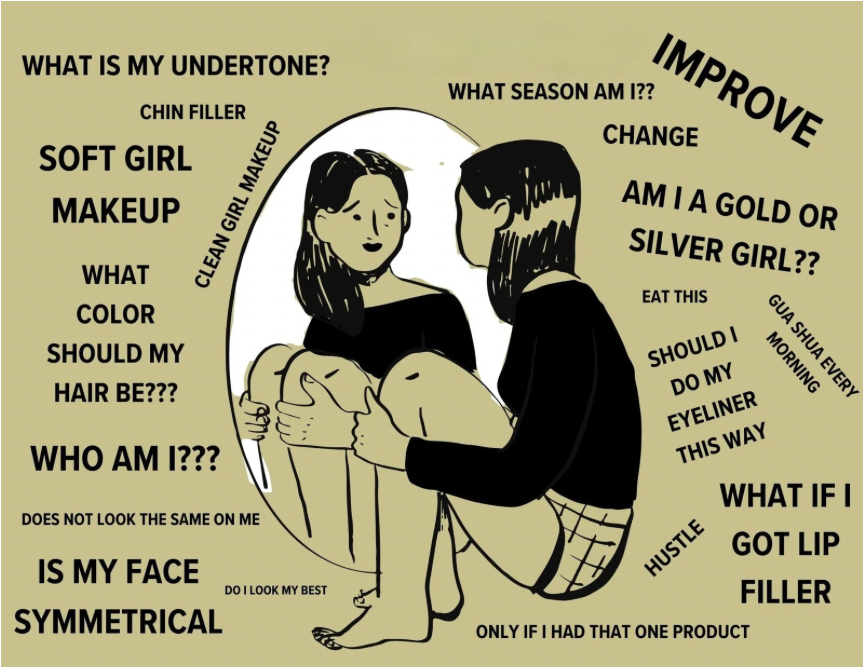On platforms like TikTok, there’s a flood of videos showcasing girls flaunting their 15-step skincare routines and flawless morning rituals. They come complete with the quintessential “clean girl” outfit and hairstyle.
TikTok has become the go-to destination for young women and men seeking inspiration for their desired lifestyles. However, beneath the surface lies a troubling trend.
This culture breeds an all-or-nothing mindset, pressuring individuals to achieve a flawless self-image. Beauty tips suggest the desired lifestyle is only possible with certain habits or possibilities. Whether it’s striving for the perfect soft girl or mob wife aesthetic, the belief persists that specific habits or possessions can fulfill one’s identity.
A new trend or must-have item fuels the pressure to keep pace with the ever-changing landscape of what’s “in” and what’s “out.”
While some influencers foster supportive communities, many promote an unhealthy obsession with perfection, perpetuating the all-or-nothing mentality.
This phenomenon isn’t confined to women; “looksmaxxing” has also emerged among young men seeking to enhance their attractiveness. Parallels can be drawn between “looksmaxxing” and trends popular among young women, such as mewing and gua sha.
However, there’s no equivalent term for this fixation on self-improvement in women’s culture.
In an article from BBC titled “Inside looksmaxxing, the extreme cosmetic social media trend,” a user of “looksmaxxing” faced criticism due to cosmetic procedures. In response, he argued that if adults took issue with unrealistic expectations online, they should also scrutinize the makeup industry, which has targeted women and girls on social media for years.
The irony is that while “looksmaxxing” for men is often criticized, similar practices are normalized for women. This raises questions about where self-improvement ends, and concerns for the mental health of women on these platforms should begin.
Here are some of the recent trends that reflect the “all or nothing” mindset:
In the beginning of 2024, people were using the canthal tilt filter that draws a red line across their face based on their eye angle. Videos using the filter show people saying “it’s over” if they have a negative tilt — or rejoicing when they have a positive tilt.
Trusting algorithms to judge attractiveness can erode self-esteem. There are many more filters like this made to measure facial portions to determine if a face is attractive or not.
In recent months, color analysis has been trending to help people find what colors suit them best, sorted into seasons based on the tone of their hair, skin, and eyes.
The trend has sparked a conversation of upset users who pay for a consultation service feeling like they have to start over with their wardrobe. The goal of the trend is always to look the best, sticking to a color palette that society deems fit for you.
The type of jewelry and color of your clothes must be perfect, or you are simply doing it all wrong and not living to your full potential.
It’s crucial to acknowledge that self-improvement and healthy living are commendable goals. However, it’s equally vital to consider how these pursuits influence self-perception. Users are meant never to be fully fulfilled; there is always something they need to fix.
There was also an ongoing trend of girls posting themselves with the caption “be brutally honest what can I do to look more pretty.” Some users go as far as actually completing tasks such as dying hair and cosmetic surgeries to feel fulfilled by random internet users feedback.
There needs to be reflection on the direction of beauty lifestyle platforms taking social media that targets young women.
In the end, filters and color theories can be fun for exploring individuality, but what happens when they don’t yield the desired results? How can we foster a TikTok community where simply being oneself is enough?
We must discern where to draw the line and call out this over-obsession that affects all genders. This can help users cultivate a healthy relationship with lifestyle improvement and self-identity in the age of social media.
It is okay to join in on the trends and style your hair color and clothing to what makes you feel confident. The main issue begins when you start to question your own identity of feeling like you do not meet what others deem as beautiful.
You do not need that stanley cup or $50 yoga set to live a fulfilled healthy lifestyle; it’s so easy to get wrapped up in fast paced trends.
Be kind to yourself, self-improvement doesn’t mean hustling every second of the day.


